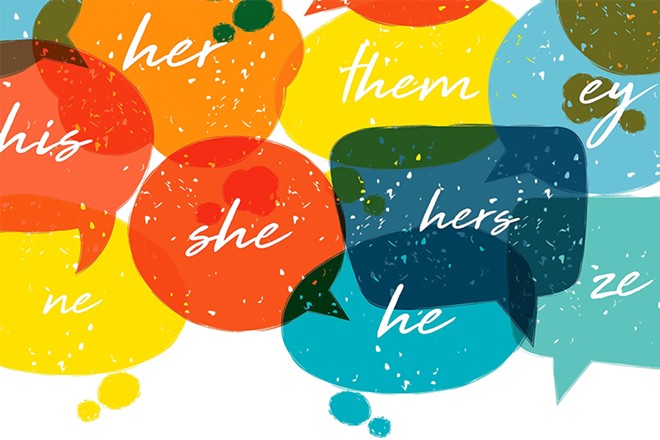Pronouns are the workhorses of the English language and I never found them to be particularly controversial – until recently.
In case you've forgotten your fourth-grade grammar lessons, some examples of pronouns are: he, she, we, they, it.
Recently, a Catholic priest in Arizona found out that sometimes the grammar police wear clerical robes and pointed hats.
For decades, the Rev. Andres Arango said, "We baptize you in the name of the ..." instead of "I baptize you in the name of ..."
After diocesan officials found that out, they said last month that people who Arango baptized aren't technically Catholic. That means they weren't eligible, from a Catholic point of view, for other sacraments.
The theological argument is that the priest is acting as a representative of God, so it should be "I" rather than "we." The parishioners sitting out in the pews are just observers – not participants in the sacrament.
Since baptism is a precursor for other Catholic rites, the thousands of people he baptized over the last several decades are left wondering if their marriages, confessions and promises of salvation have ceased to exist.
All that angst and worry comes from either:
A. A priest who made a grammar mistake.
B. Overly legalistic individuals in the religious hierarchy.
My thoughts? Salvation isn't like a computer password dependent on every letter being in place when a priest recites the rite while pouring water over an infant's head.
But pronouns can be confusing. I learned that decades ago when I was taking management training at the Quad-City Times. Some management guru told our class, when giving instructions to a subordinate, don't say, "I want you to do this." Instead, one should say, "We will be doing this."
The idea is that by saying "we," the subordinate feels like a member of the team rather than a lackey being ordered about.
So, I left the class and wrote up an assignment for a photographer, saying, "We will be shooting a photo of..."
The photo never got shot. Why? The photographer said he couldn't find me when it was time to leave, and since I said "we" on the assignment form he assumed both of us needed to go.
My boss, who had been sitting through the same stupid management class with me, chewed me out for filling out the photo assignment form wrong.
So, you see, pronoun usage can be consequential.
Jeanne Ives, a conservative former state representative, expressed outrage during a recent interview that a former GOP office holder has placed "preferred pronouns" on the bottom of her emails.
"She's no conservative, if she's doing that," Ives said.
So, apparently pronoun usage is not just a matter of grammar, but political identity. I take a libertarian live-and-let-live approach. Folks should be able to identify in the manner they choose.
Still, I don't like the practice of referring to individuals who don't identify as male or female with a plural pronoun.
For example, back in 2019, my alma mater's student newspaper wrote a feature on a biologically male campus police officer who identifies as non-binary.
Here is a sentence from the story:
"Other than snide comments, Hale said they receive interesting looks on campus when they're wearing heels, a dress or have their nails done, but they have never been so uncomfortable that they felt something needed to be done about the remarks and looks."
I'm left wondering, is the sentence about one person or a group?
Language needs to be precise. This grammatical accommodation, which the Associated Press has endorsed, is anything but. Perhaps instead of using a plural pronoun, a new pronoun needs to be created to accommodate those not identifying as male or female.
For example, in the 1970s, "Ms." was created as a courtesy title for women who didn't want to be identified as married or single. (Although the grammarian in me still wonders why there is a period after the "Ms." when it's not an abbreviation. But that's a language quandary for another day.)
Grammar is consequential. It should be precise but not unkind. Words matter.
Scott Reeder, a staff writer for Illinois Times, can be reached at [email protected].























